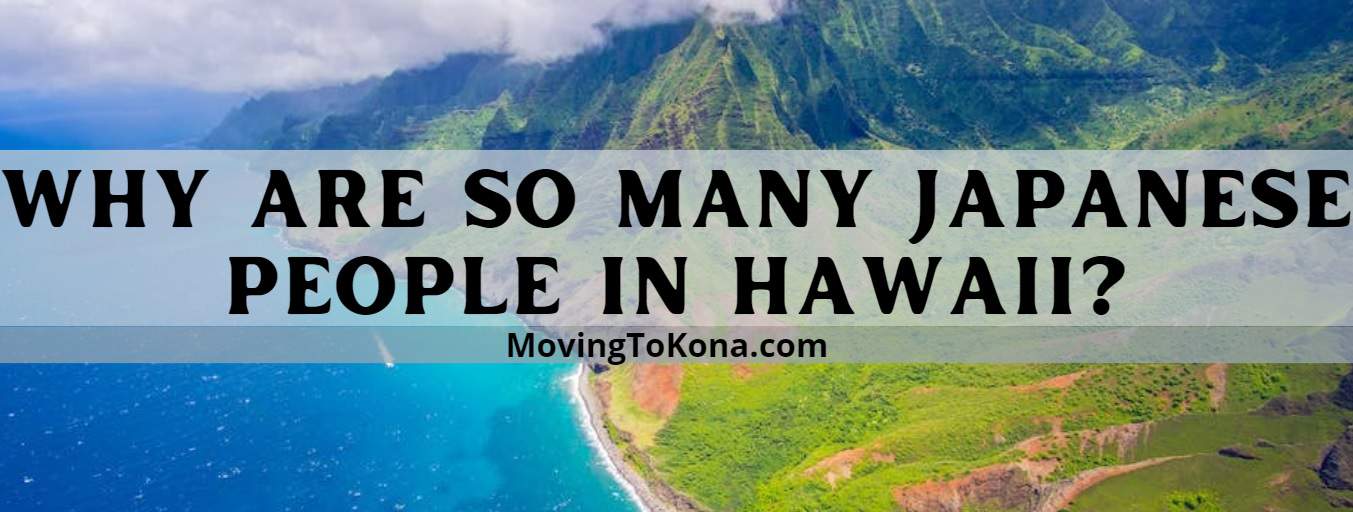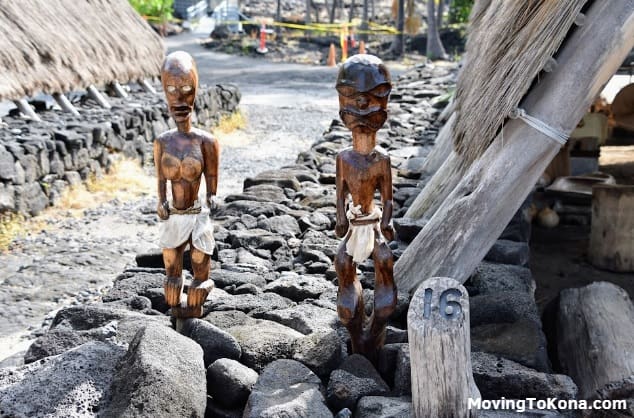Why Are There so Many Japanese People in Hawaii?

Reasons Why Japanese People Move to Hawaii
1. To live in a tropical climate
The Japanese have been drawn to the Hawaiian Islands since the late 1800s due to its booming pineapple, coconut and sugarcane plantations. These plantations provided jobs and a stable income to many Japanese immigrants, who were invited to Hawaii due to the need for more workers in the agricultural sector. Japanese immigrants were also attracted to Hawaii because of its relatively short 7-8 hour flight from Tokyo and the availability of Western goods at cheaper prices than back home. Furthermore, the long history of the Japanese community in Hawaii provided a sense of community, familiarity and belonging to those who moved there. The influx of Japanese immigrants has been an important factor in shaping Hawaii’s multicultural society and culture. Finally, the island’s warm tropical climate and beautiful natural scenery were also major attractions for the Japanese. This has made Hawaii an increasingly popular destination for tourists from Japan, and a vibrant home for many Japanese immigrants.
2. To escape the cold weather
The weather conditions in Hawaii differ greatly from those in Japan. In Hawaii, temperatures typically range from warm to hot, with tropical climate conditions. In contrast, Japan experiences more extreme weather, ranging from cold winters to hot, humid summers. In terms of precipitation, Hawaii averages more than 60 inches of rain annually, while Japan receives much less rain, around 40 inches per year. Furthermore, Hawaii is known for its year-round sunshine, while Japan often experiences overcast days.
3. To enjoy the beaches
The beaches in Hawaii offer a variety of attractions that make it a desirable destination for Japanese tourists. From the well-established Japanese community in Hawaii, to the relatively short 7-8 hour flight from Tokyo, and the availability of Western goods at prices that can’t be beat compared to prices in Japan, there are many reasons why Japanese people are drawn to the beaches of Hawaii. Additionally, Japanese popular culture and festivals, such as anime and manga, obon and hula dancing, have become increasingly popular in Hawaii, giving Japanese people a sense of comfort and familiarity when they visit. With the recent restart of daily flights to Hawaii from Japan’s two biggest airlines, ANA and JAL, the ease of travel to the islands has only increased, leading to more Japanese people making the journey to Hawaii. Taken together, these factors make it no surprise that Hawaii continues to be one of the most popular overseas holiday destinations for Japanese tourists.
4. To experience a different culture
The main reason why Japanese people have moved to Hawaii is due to the desire to pursue a better life and increased economic opportunities. In the early colonial period, many immigrants came to the islands as plantation workers. This provided them with better wages and the opportunity to build a better life. The Nikkei society, which is a community of Japanese origin in Hawaii, was formed due to the contact with other ethnic groups and this fluidity of travel back and forth to Japan. Moreover, the diverse cultural and natural environment of Hawaii has attracted many Japanese to the islands, who are drawn to its unique culture and beauty. Japan has also been heavily influenced by the Hawaiian culture, with Hawaiian-themed festivals and restaurants becoming popular in cities like Tokyo, Yokohama and Osaka. The hula dance, in particular, has become an iconic part of Japanese culture, and the ability to experience and learn the Hawaiian culture in a more relaxed environment is something that many Japanese people have been drawn to.

5. To explore different hobbies
Japanese people who move to Hawaii often explore a variety of hobbies such as hula dancing, ukulele playing, and Hawaiian food. Additionally, they may attend Hawaiian-themed festivals, which have become very popular in places like Tokyo, Yokohama, Osaka, and even rural areas like Ikaho Onsen. These events provide an opportunity for people to learn more about the culture of Hawaii, as well as to experience the warmth and joy of the islands. Beyond festivals, many Hawaiian restaurants have also opened up in Japan, providing a taste of the islands for those who can’t make the trip. Finally, some may take part in traditional Buddhist summer festivals, like Obon, which are held over the summer and provide a chance to honor ancestors and explore the local culture.
6. To be close to the sea
The primary reasons why Japanese people move to Hawaii to be close to the sea are the well-established Japanese community in Hawaii, the relatively short 7-8 hour flight from Tokyo, the availability of Western goods at prices unbeatable compared to what they are in Japan, and the stunning oceanfront views. These factors have enabled a steady influx of Japanese tourists and investors to Hawaii, which has been beneficial to the local economy. Furthermore, the Chinese company China Oceanwide has invested heavily in Hawaii’s real estate market, particularly in West Oahu, providing more opportunities for local businesses and foreign investors. This in turn has attracted more Japanese people to the islands, as they are increasingly drawn to the natural beauty, culture and potential business opportunities of Hawaii.
7. To have easier access to American citizenship
The purpose of moving to Hawaii for Japanese people seeking American citizenship was to find work and establish a better life. The Hawaiian government was eager to settle a “kindred and kindly people” like the Japanese, as it was believed that they would be beneficial to the economy. The treaty of 1871 between Japan and Hawaii facilitated the process of immigration, and in 1883, the Hawaiian government appointed a minister plenipotentiary to Japan to further negotiations for immigration. The increase in Japanese population in Hawaii since 1910 shows that the process was effective, with 37.1% growth in the Japanese population during that decade. Japanese immigrants moved to Hawaii to pursue economic opportunities, establish new lives, and ultimately, to seek American citizenship.
8. To have better job opportunities
Job opportunities in Hawaii for Japanese people have grown significantly since the early days of migration. The islands welcomed many early immigrants who traveled to work on the pineapple, coconut, and sugarcane plantations. Today, there are a variety of jobs available for Japanese people in Hawaii, ranging from tourism and hospitality to healthcare, finance, and technology.
One of the main reasons why Japanese people are attracted to Hawaii is the diverse, vibrant culture that the islands offer. The islands’ warm climate and stunning beaches also make it an ideal spot to live and work. Additionally, the well-established Japanese community in Hawaii provides a sense of comfort and familiarity to newcomers, making it easier to adapt to the lifestyle.
The availability of Western goods at prices much lower than in Japan is another attractive factor for those considering a move to Hawaii. With the relative proximity of Tokyo, those wishing to travel back and forth between the two countries can do so with relative ease.
Overall, Hawaii is an attractive destination for Japanese people due to its diverse culture, warm climate, and job opportunities. The well-established Japanese community, low cost of goods, and ease of travel also make it an ideal location for many.
9. To have improved quality of life
Living in Hawaii is better than living in Japan for a number of reasons. For one, Hawaii is only a 7-8 hour flight from Tokyo, making it easily accessible for Japanese tourists and those seeking to move to Hawaii. Additionally, the well-established Japanese community in Hawaii makes it more welcoming to those from Japan and provides more opportunities for cultural exchange. Furthermore, the availability of Western goods at cheaper prices than those in Japan is another excellent reason to choose Hawaii over Japan. Finally, the unique climate of the islands has allowed for the successful production of a number of Japanese foods, including bento, sashimi, tofu, and soy sauce, that are not available in Japan. In short, the combination of cultural exchange, affordability, and climate make living in Hawaii a much more desirable option than living in Japan.
10. To be closer to the Japanese community
The main reason why Japanese people move to Hawaii is to be closer to the well-established Japanese community. Although the Japanese population in Hawaii comprises only 15% of the total population, this minority group has a large impact due to the fact that there is no majority group. In addition to the community, Japanese people are drawn to Hawaii by its relatively short flight time from Tokyo, the availability of western goods at unbeatable prices, and the increasing popularity of Japanese popular culture like anime and manga, as well as Japanese food. Hawaiian-themed festivals and restaurants provide a taste of Japanese culture, while Japanese classes and hula dancing classes offer an even more immersive experience. All this makes Hawaii an attractive option for Japanese people looking to experience a closer connection to their culture.
How Many Japanese People Live in Hawaii?
According to the 2010 census, there were 312,292 people of Japanese descent living in Hawaii, making up 17 percent of the total population. This makes Japanese people the second largest ethnic group in Hawaii.
What Impact do Japanese People Have on Hawaii?
The Japanese people have had a large impact on Hawaii, both culturally and economically. As the second largest ethnic group in Hawaii, their influence has been significant. Culturally, Japanese traditions have been integrated into daily life on the islands, from language to cuisine to popular culture. Economically, the Japanese immigrants to Hawaii in the late 19th century brought with them an expertise in the sugar cane industry, leading to a booming plantation business. In addition, the Immigration Act of 1907 and its restriction on foreign laborers further solidified the presence of Japanese people in Hawaii. This has had a lasting impact on the culture and economy of the islands, making the Japanese people an integral part of Hawaii’s history.
